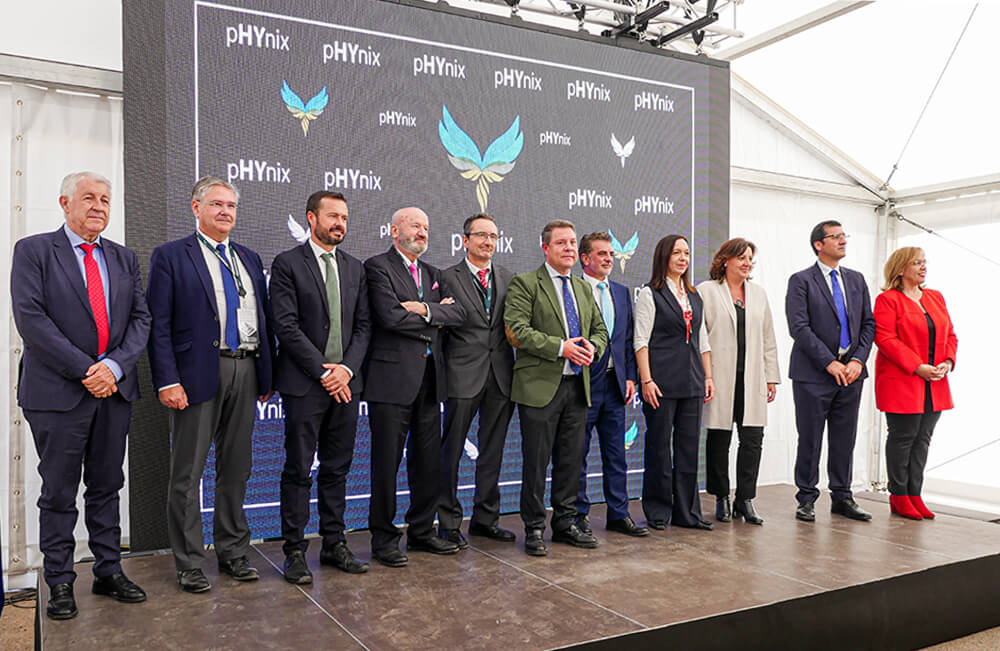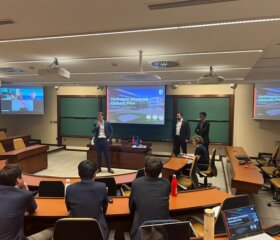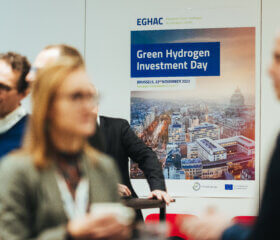
pHYnix announces Barataria, its second 70 MW renewable hydrogen production project during groundbreaking of first 10MW Vitale project
- On the occasion of the foundation stone ceremony of Vitale, the first commercial-scale renewable hydrogen production project in Spain with an electrolyzer power of 10 MW, pHYnix presents its second project: Barataria. The two plants will produce nearly 12,000 tonnes of hydrogen per year.
- pHYnix already has the building permit to start building Vitale. The Barataria project, with an electrolyzer capacity of 70 MW, is in the process of obtaining the necessary permits to begin construction within a year.
- The President of the Junta de Castilla La Mancha, Emiliano García-Page, chaired the event together with the Mayor of Alcázar de San Juan, Rosa Melchor, accompanied by the Regional Director of Sustainable Development, José Luis Escudero, the Regional Director of Economy, Trade and Employment, Patricia Franco as well as the President of the Department of Ciudad Real, José Manuel Caballero.
- The combined production of Vitale and Barataria, ie 12,000 tonnes/year, will prevent the emission of 144,000 tonnes of CO2 per year, equivalent to the capture of 4,500 hectares of forest.
- Emiliano García Page underlined the importance of this project for Castilla – La Mancha and for Spain: “ in the face of so many uncertainties, we are the protagonists of something important for today and for tomorrow ” .
pHYnix, independent producer of renewable hydrogen, celebrated this morning in Alcázar de San Juan, the laying of the first stone of its Vitale renewable hydrogen production plant, with an electrolyzer power of 10MW. This event marks the beginning of the construction of the plant, the local authorities having already granted the corresponding construction permit. The site will be operational in early 2024.

The President of the Junta de Castilla La Mancha, Emiliano García-Page, chaired the event together with the Mayor of Alcázar de San Juan, Rosa Melchor, accompanied by the Regional Director of Sustainable Development, José Luis Escudero, the Regional Director of Economy, Trade and Employment, Patricia Francoas well as the President of the Department of Ciudad Real, José Manuel Caballero.
Emiliano García – Page wanted to emphasize how “ today we are doing something that will transcend future generations” while pointing out that projects such as Vitale are opportunities for the present and for the future. “ Faced with so much uncertainty, we are the protagonists of something important for today and tomorrow . »
For his part, Jean-Pierre Riche , President of pHYnix, announced the second renewable hydrogen production project, the construction of which could begin within a year. Called Barataria, this 70 MW power project, which is currently in the authorization phase, will increase Vitale’s capacity sevenfold and produce 10,250 tonnes of hydrogen per year from 2025.
Jean-Pierre Riche thanked the authorities of Castilla La Mancha, Ciudad Real and Alcázar de San Juan, for their firm commitment since 2017 in favor of renewable hydrogen as “ an energy vector for the transition towards a more sustainable economy. It is exciting to achieve key milestones, such as today, for Vitale and Barataria, with their nearly 12,000 tonnes of combined annual production, to very quickly decarbonize local industry, heavy transport and mobility, as well as the export of renewable gas to the European market through injection into the gas network”.
Jean-Pierre Riche also assured that ” pHYnix is making this decarbonization initiative a reality thanks not only to the construction of the two power plants, but also to the agreements signed with various companies for the distribution of renewable gas “.
Vitale, a pioneering 10 MW project
pHYnix has already obtained a building permit from the town hall of Alcázar de San Juan to begin construction of its first centralized renewable hydrogen plant. Vitale will gradually produce 4.13 tonnes of renewable hydrogen per day, or 1,450 tonnes per year, starting in 2024. The renewable gas produced will provide emission-free fuel for local industry, logistics, freight transport and to mobility in the Community of Madrid, as well as to other users through the natural gas network.
In this regard, Vitale is a pioneering project in the injection of hydrogen into the natural gas network, in accordance with the percentages currently authorized. pHYnix thus takes an important step in its vision of producing renewable hydrogen at a competitive price in the Iberian Peninsula to supply the European market.
Barataria, a project to eliminate 126,000 tonnes of CO2 per year
Barataria will be the second plant built by pHYnix in Alcázar de San Juan, with a power of 70MW and a production volume of 10,250 tons of renewable hydrogen per year.
The combined production of Vitale and Barataria, ie 12,000 tonnes/year, will prevent the emission of 144,000 tonnes of CO2 per year, equivalent to the capture of 4,500 hectares of forest.
The construction and commissioning of these two power plants will give impetus to the city of Alcázar de San Juan in terms of job creation, estimated at 500 direct, indirect and induced jobs, economic dynamism thanks to subcontracting certain services to local businesses and contributing to the achievement of the European Union’s emission reduction targets for 2050.
Benefits of Renewable Hydrogen
pHYnix is committed to renewable hydrogen as a zero-emission energy carrier, key to the decarbonization of energy-intensive and currently highly polluting sectors. Renewable hydrogen, produced from the electrolysis of water using photovoltaic or wind energy as a primary source, contributes to the energy independence of countries or territories, reduces the use of fossil fuels and ensures the consumption stability. It also allows the progress of local economies, contributes to the preservation of the environment and, therefore, curbs climate risk and improves the well-being of people.




